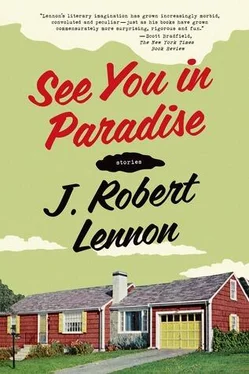It took a couple of seconds for the hilarity to wane and for the guests to realize that they would now be expected to amuse themselves. During this awkward silence, Peck turned to Brant and, loudly enough so that others should hear, said, “You must be that Brant.”
“Yes!” Brant replied brightly.
The two stared at each other for a moment, and in that moment Brant saw his chance with this man roar past, flag-waving revelers shouting out its bunting-underslung windows, and recede into the distance. It was gone before he even knew what it was, a distant speck leading a dust cloud.
Peck was smiling at him. Brant had seen this face before, of course, in flash photographs in magazines or pen-and-inked onto the front page of the Wall Street Journal ; it was familiar but unmemorable, like a second-rate old pop song. And the eyes: you’d expect the eyes of a man like this to be direct, penetrating, alive: but instead they were furtive, blurred, facing in slightly different directions. The skin was sallow, blotched, creased; the cheeks cadaverous. But the forehead! This, Brant thought, was what did all the work, this gleaming hemisphere that looked like it had been dragged here by a glacier. It bore neither hairs nor pores, this wall, and behind it the killing thoughts cozied up against one another. As Brant gazed at it the mouth beneath it opened and words came out. “Perhaps we ought to shake hands, Brant.”
“Oh, sure!”
Peck took Brant’s hand, but took it limply, making Brant’s strong grip, intended to express a marriageable masculine confidence, instead seem like a withering critique of the old man’s waning virility. Peck actually winced, and Brant jerked his hand away. “Uh, I ought to thank you, sir, for the—”
“Please,” Peck said, secreting the hand back under the table, “there’s no need to grovel. Now, Brant.”
“Yes, sir?”
“You’re diddling my daughter.”
“Yes, sir.”
“You’re thinking of marrying her, right?”
“Uh, yes.”
“Getting yourself a piece of the family fortune?”
“Well, that’s—”
“Don’t be ashamed, Brant, that’s how I got started on mine. I took one look at Cynthia’s mother, at that stunning horse face and that glorious udder, and I said to myself, there’s a twenty-four-carat cunt if I ever saw one. You can believe I got in there but quick.”
There was nothing Brant could say to this; if he protested, he would be branded a liar; if he agreed, he would be a prick. If he said nothing, he would be a weakling. He said, “Uh huh!”
“But I’m not a pussy, Brant, and neither are you. I had to work for my supper, and so will you. I did my time at her father’s company, and so will you.”
“I will?”
“Yes. You’re going to man the home office.”
“I am?”
“Yes. You’re going to become chief of operations at headquarters.”
Brant didn’t get it. He said, “In New York?”
Peck laughed — it was what he wanted to hear. “Guyamón.”
“Guyamón?”
“It’s a lesser Bermuda. A tax dodge. We have to have an office there. Staffed by a staff of one. The job is currently occupied, but if you say yes, he’s fired.” Peck removed a cell phone from his pocket — a rather large one by present standards, mid-nineties vintage, a charming affectation. “If you say no, you can get the hell out of my daughter’s graduation party, and if you ever again so much as fondle a tit I’ll have all your arms broken. And don’t think I can’t do it.”
Brant looked past him to Cynthia, who, though while theoretically engaged in a conversation with an avid middle-aged couple, was glancing his way, her eyebrows expectantly arched, her mouth tilted in a hopeful, nervous smile. He had to admit that, for the whole night up until now, he had not been feeling super about Cynthia. The party had cast a tawdry light upon her; she did not seem worth all the hoopla, which in turn felt excessive, striving. But now, after staring at her father’s creepy mug for minutes on end, Brant experienced a loosening of critical faculties, and saw Cynthia as lovely and strong, and remembered her playfulness, her sexual enthusiasm, and her beautiful car, and suddenly he felt that he could not do without her. Something about her laugh, the one her father had drawn from her, made him hesitate, but it wasn’t enough. He wanted her. Hell, he loved her! He turned back to her father. He said, “I’ll do it.”
“Great,” said Peck, without much enthusiasm, and pushed two buttons on the phone. “Serkin? Peck. You’re fired. The plane leaves at seven p.m. Thursday. Get on it, or you’re stuck. Goodbye.” He pushed another button, and then two more. “Book Brant’s flight,” he said, and hung up.
“Go home,” he said now to Brant, tucking the phone back into his jacket pocket.
“Home?”
“To pack. You’re leaving tomorrow. A car will pick you up at noon. Good luck.” He cleared his throat and fell upon his meal, which had been placed before him by a napkin-draped arm.
“But don’t I—”
“Go,” muttered Peck through a mouthful of broccoli. “Don’t worry about the details. A packet will be waiting for you in the car. Go ahead, smooch your honey and vamoose.”
He rose, went over to Cynthia. “I have to go,” he whispered in her ear.
“So you said yes?”
“Yes.”
“Oh, Brant!” she said, and craned her neck to kiss him. When he hazarded a glance at her father, he could see that he was paying no attention at all.

He left a message for his boss on voicemail. “I’m sorry,” he explained, “Peck’s making me take this job. I’ll send you an email.” But he wondered if there would even be email on Guyamón, or restaurants, or television. He would miss restaurants and television — would miss delivery food, football. But surely Guyamón had these things — it was the Bahamas, it was a tourist destination. Probably there would be cool mixed drinks served at rattan taverns on the beach. There would be friendly natives in colorful shirts, and drunk Americans, and crazy birds that made crazy sounds. “Don’t worry about your apartment,” a voice had said on his answering machine when he got home from the commencement dinner. “Don’t worry about anything. It will all be taken care of. Bring only those things you can’t do without.” For Brant, these were: his “property of” shirt from the business school, his Bob Marley CDs (and wasn’t Guyamón near Jamaica? Maybe he ought to have an atlas), a picture of his mom, a picture of Cynthia (presented to him on his birthday, it was taken by a famous fashion photographer Brant had never heard of and tucked into a neat silver frame), and a toothbrush. He brought along three suits and seven shirts, as well. All the next morning he tried to get in touch with Cynthia, but she wasn’t home. He left five messages. His boss called him and pleaded. He called his mother and sister, both of whom told him he was nuts. That was okay. In fact it was great! He felt, briefly, as if he were on the threshold of a fabulous future. “We thought he was nuts, but in the end, Brant was right.”
A dented Lincoln picked him up; the driver wore an old-fashioned driver’s hat and called him sir. He checked in at the airport, got on a plane, and flew first to New York, then Nassau. There, a gangly black man wearing aviator sunglasses (and why not? he was an aviator) led him across a steaming tarmac to a little four-seater with a picture of a turkey stenciled on the side.
“What’s with the turkey?” Brant shouted over the buzz of the engine, a buzz that seemed somehow insufficient.
The pilot pointed to his ear, shrugged.
Читать дальше













